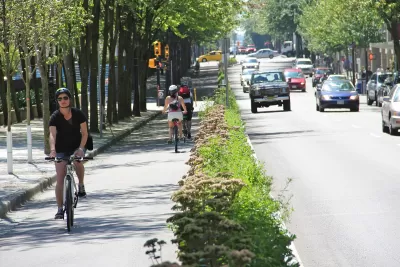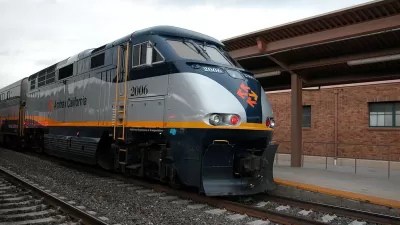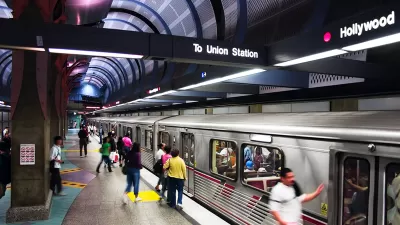Local and state agencies can apply for federal Complete Streets funding without matching funds until 2026.

In an effort to prioritize safer streets and more accessible transportation options, the Federal Transit Administration (FTA) announced it will waive a local funding match requirement for Complete Streets planning projects through 2026, reports Dan Zukowski in Smart Cities Dive. The waiver applies to projects funded by the Metropolitan Planning Program and the State Planning and Research Program.
“The waiver will support the full consideration of public transportation in the development and implementation of Complete Streets policies that require or encourage a safe, comfortable, integrated transportation network for all users, regardless of age, ability, income, ethnicity, or mode of transportation,” FTA Administrator Nuria Fernandez said in a letter shared on the FTA website.
Eligible activities include the development of Complete Streets standards, mobility and accessibility projects, connectivity plans, and policies to support transit-oriented development (TOD). This ties back to a rule written into the Bipartisan Infrastructure Law that requires states and metropolitan planning organizations to allocate 2.5 percent or more of planning funds to Complete Streets projects. In early 2022, the Federal Highway Administration (FHWA) launched an effort to make the design of federally funded roadways more aligned with the Complete Streets approach.
FULL STORY: Complete Streets local funding match requirement waived through 2026, FTA says

Study: Maui’s Plan to Convert Vacation Rentals to Long-Term Housing Could Cause Nearly $1 Billion Economic Loss
The plan would reduce visitor accommodation by 25,% resulting in 1,900 jobs lost.

Alabama: Trump Terminates Settlements for Black Communities Harmed By Raw Sewage
Trump deemed the landmark civil rights agreement “illegal DEI and environmental justice policy.”

North Texas Transit Leaders Tout Benefits of TOD for Growing Region
At a summit focused on transit-oriented development, policymakers discussed how North Texas’ expanded light rail system can serve as a tool for economic growth.

San Diego County Sees a Rise in Urban Coyotes
San Diego County experiences a rise in urban coyotes, as sightings become prevalent throughout its urban neighbourhoods and surrounding areas.

Los Angeles County Invests in Wildfire Recovery for Parks, Trails, and Open Space
The $4.25 million RESTORE Program supports the recovery of parks, trails, and open spaces damaged by the January 2025 wildfires through targeted grants that promote community healing, wildfire resilience, and equitable access to nature.

Nevada Bills Aim to Establish Home Insurance Assurance Amidst Wildfire Risk
Republican sponsor hopes the FAIR plan would be “a true market of last resort.”
Urban Design for Planners 1: Software Tools
This six-course series explores essential urban design concepts using open source software and equips planners with the tools they need to participate fully in the urban design process.
Planning for Universal Design
Learn the tools for implementing Universal Design in planning regulations.
Smith Gee Studio
Alamo Area Metropolitan Planning Organization
City of Santa Clarita
Institute for Housing and Urban Development Studies (IHS)
City of Grandview
Harvard GSD Executive Education
Toledo-Lucas County Plan Commissions
Salt Lake City
NYU Wagner Graduate School of Public Service





























